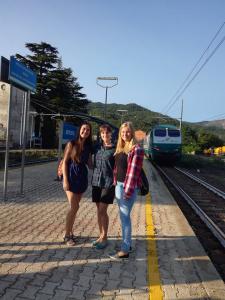Dátum konania
20/08/2018 - 26/08/2018
Miesta konania
Granara, Italy
Typ projektu:
feedback od účastníčok:
“Ahoj. Tréning bol perfektný. Bolo to pre mňa niečo nové a nezvyčajné. Projekt plný diskusií, hier, ale aj aktívneho oddychu,skvelého talianskeho jedla, nových internacionálnych priateľstiev. Rozšírila som si svoje obzory, dalo mi to nové pohľady na proces vzdelávania a hlbšie zamyslenia sa nad na prvý pohľad obyčajnými situáciami, hrami a rôznymi inými aktivitami vo vzdelávaní. Som veľmi vďačná, že som mohla byť súčasťou.” Karolína
“Aj ja sa pripájam. Moje pocity tesne po projekte boli nejasné a potrebovala som si všetko dobre premyslieť, avšak teraz vidím že mi tréning dal veľa skúseností a nový pohľad na veci z bežného života. Hlbšie sa zamýšľať, hľadať príčiny správania ľudí okolo mňa, počúvať. Diskusie, aktivity, účastníci aj tréneri, jedlo, prostredie ekodedinky, všetko hodnotím na jednotku. Som veľmi vďačná za skvelú príležitosť!” Barbora

O čom tréning bol?
Working with the youngsters has always meant to work hard for the construction of the future. In front of phenomenons that strongly characterize our era, such as climate changes, economical crisis, migrant fluxes that keep growing, as well as in front of an escalation of violence, of a politic always more distant from citizen’s needs… Which kind of scenarios do we have in front of us nowadays?
Working today with the youngsters means to face challenges that does not only regard the anxiety and the uncertainty due to their phase in life cycle, but means also to face challenges linked to socially caused disadvantages in an historical moment in which the malaise becomes mistrust and impotence, as also becomes disintegration, intolerance and violence.
Which kind of contribution may the youth workers, involved in non formal education contexts, give to the construction of new meaningful horizons and to the construction of new social citizenship models, both inspired to nonviolence values?
Which courses of action could be appropriate to create contexts that promote a growth autonomous and respectful of differences in an intercultural world? Urgency force us to choose simplified solutions, often merely to contain and answer to emergency, but that don’t consider the quality of contexts we are living in, so that these solutions only put a patch and postpone problems. How can the theory of complexity help us to develop coherent visions and practices, appropriate to world fast changes? Which kind of learnings are suitable for live in more and more heterogeneous contexts? During the seminar we will explore, through games and non formal education activities, these questions guided from/following a systemic and ecological approach, non-violence orientated.
GOALS of the training were following:
- to create a context of knowledge, exchange, reflection among youth leaders and workers operating in different local contexts on ideas, practices and issues related to their profession and to their social role;
- to create a space for experiment and share educational practices to increase youth workers expertise, so that they can be able to intervene in a conscious and flexible way in their non formal education contexts;
- to train to a non-violent culture and to active citizenship;
- to deepen ideas and intervention ways in intercultural contexts;
- to open to an interpretative view of reality that consider and respect its complexity.
Účastníci boli z Talianska  , Bulharska
, Bulharska  , Grécka
, Grécka  , Rumunska
, Rumunska  , Litvy
, Litvy  a Slovenska
a Slovenska  . Z každej krajiny bolo po 3 účastníkov.
. Z každej krajiny bolo po 3 účastníkov.


